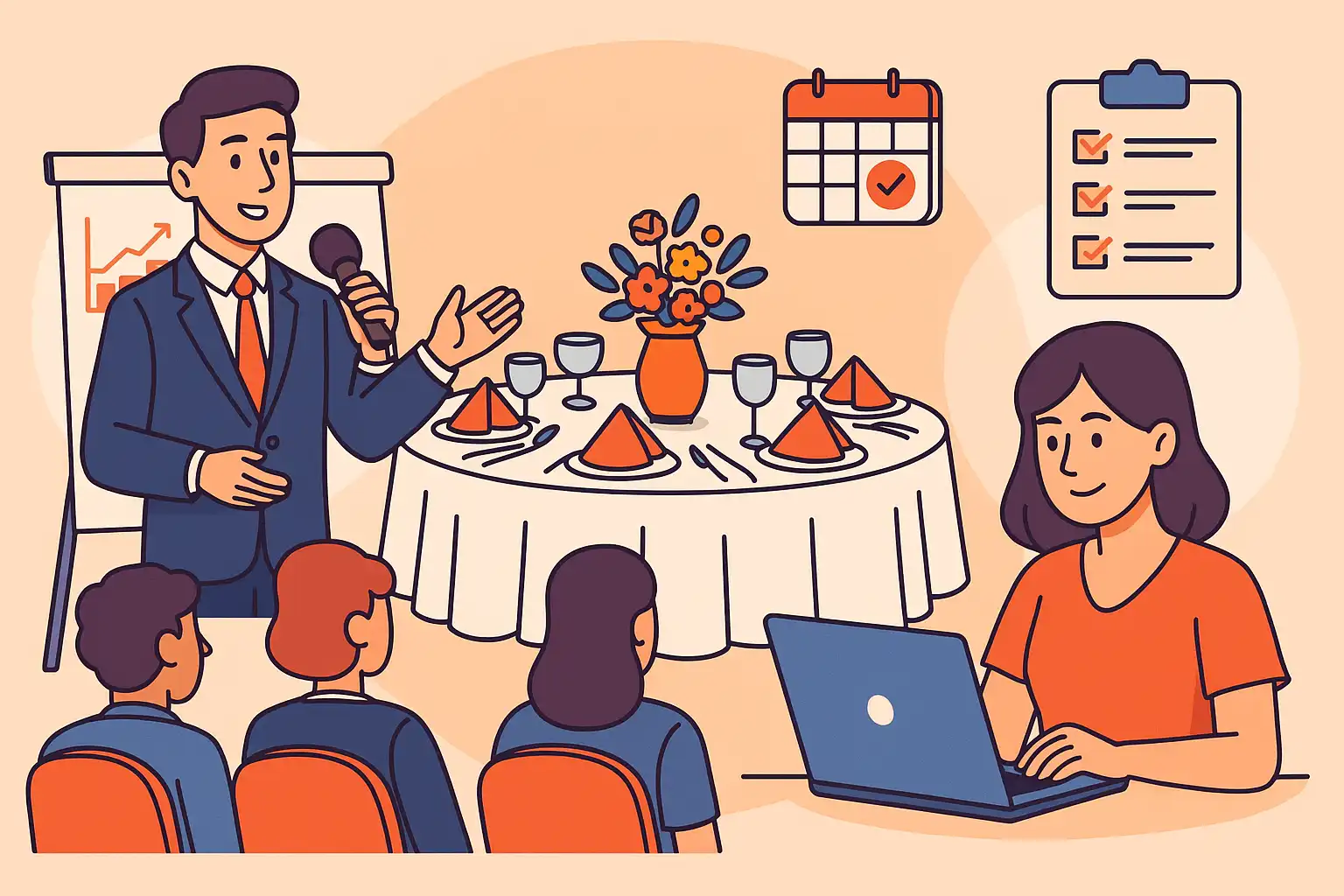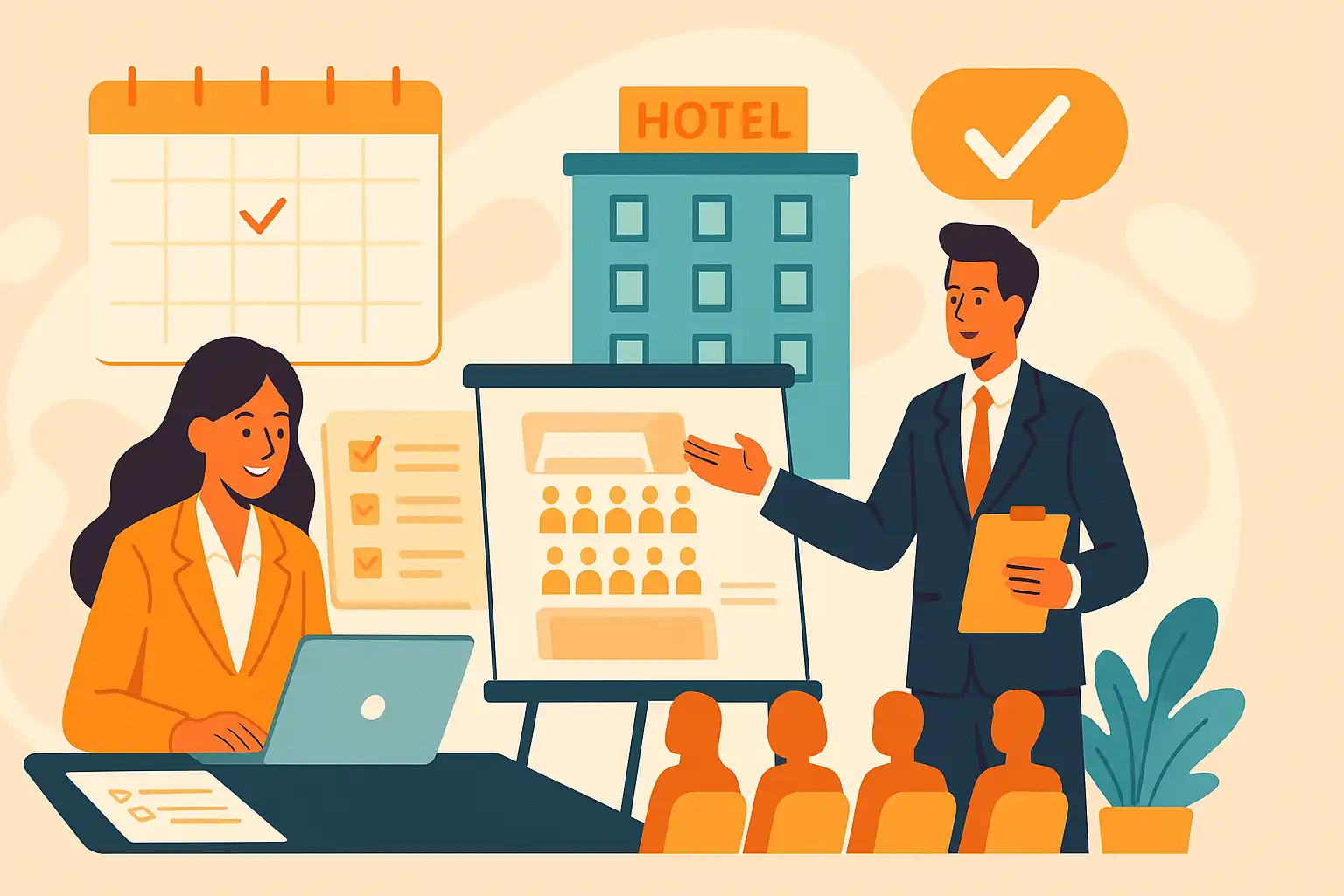Hotel Event Planning: Managing Successful Hotel Events
 Mika Takahashi
Mika Takahashi Mika Takahashi
Mika TakahashiThe events industry is a massive opportunity for hotels around the world, often accounting for 20-30% of a property's total revenue. Whether it’s a small corporate meeting or a grand gala in a ballroom filled with hundreds of guests, hotels provide the perfect setting for unforgettable occasions that require careful planning and flawless execution.
But hotel event planning is about much more than just offering a space. It’s a complex web of services, from coordinating catering and managing technology to working with vendors and smoothly integrating events into the hotel’s daily rhythm. As client expectations grow more sophisticated, hotel event planners and hotel staff need to blend traditional hospitality excellence with the latest event technology.
This guide will take you through every step of hotel event planning, from the first client meeting to the final follow-up after the event. Whether you’re an experienced hotel event manager looking to sharpen your skills or someone curious about a career in this exciting field, you’ll find essential tips, proven strategies, and insider knowledge to help you create standout events that boost revenue and delight clients.

Hotel event planning involves coordinating and managing events held within hotel properties, making it a vital revenue source that fits seamlessly with other hospitality services. Unlike independent event planning, hotel event coordination takes advantage of the hotel’s existing infrastructure, staff, and amenities to deliver a cohesive and memorable experience.
The range of events hosted by hotels is vast, from intimate executive meetings to large conferences and festive social events. Common hotel events include corporate conferences, weddings, product launches, charity galas, and trade shows. Each event type demands its own approach to space setup, catering, and guest experience.
What sets hotel event planning apart is the access to resources like in-house catering, accommodation options for out-of-town guests, and established vendor relationships. This integration makes logistics smoother and often more cost-effective. However, it also means event planners must carefully coordinate with daily hotel operations to avoid disrupting other guests.
Events are a major revenue driver for hotels, typically making up 20-30% of total income for properties with dedicated event spaces. Beyond direct event fees, successful events often lead to increased bookings for rooms, spa visits, and dining, adding even more value.
To pull all this off, hotel event planners work closely with multiple hotel departments—from housekeeping prepping event spaces, to front desk managing guest arrivals, to restaurants balancing kitchen capacity. This level of coordination is unique to hotel event planning and presents both opportunities and challenges for hotel event managers.
At the heart of every successful hotel event are three key components working in harmony: venue and space management, catering and food service coordination, and technology and audiovisual support. Each requires specialized expertise and careful attention to detail.
Managing hotel event spaces means understanding the different ways ballrooms and meeting rooms can be set up. For example, theater-style seating fits the most people, while banquet rounds reduce capacity by about 40%. Cocktail setups can actually hold 50% more guests than seated arrangements.
Allocating meeting rooms and breakout spaces takes strategic planning to balance guest comfort and revenue. Event planners think through traffic flow, sound separation for simultaneous events, and proximity to essentials like restrooms and catering prep areas. Many hotels keep detailed capacity charts to help optimize space use.
Outdoor spaces like terraces, gardens, and poolside areas add charm but also complexity. They require backup plans for weather and extra infrastructure for power and lighting. Good event managers build strong vendor relationships to quickly transform these spaces into elegant venues.
Maximizing revenue means knowing when demand peaks and adjusting pricing accordingly. Premium dates and times command higher rates, while off-peak slots are priced competitively to keep bookings steady. Room blocking for multi-day events helps secure group business while keeping enough rooms for other guests.
Menus today need to be more personalized and health-conscious than ever. Event planners keep detailed records of common dietary restrictions and work closely with chefs to craft menus that please all guests without compromising quality.
Timing the kitchen and service is a delicate dance. Banquet event orders (BEOs) spell out exact schedules, service styles, and special requests, ensuring hot food arrives perfectly timed even during multiple events.
Bar services and beverage packages can be a big revenue boost. Smart hotel event managers create attractive drink options that encourage guests to upgrade while keeping consumption responsible. Premium bars, wine pairings, and signature cocktails often add significant per-person revenue.
Coordinating with the hotel’s main restaurant is crucial to avoid scheduling conflicts and ensure enough staff. During busy event seasons, restaurants might adjust hours or service styles to handle the extra demand, affecting everything from ingredient orders to dishwashing.
Managing AV equipment like projectors, sound systems, and lighting is essential. Hotels investing in reliable, high-quality gear can reduce costly rentals and offer competitive pricing. Regular maintenance and backup plans keep events running smoothly even when tech issues pop up.
Wi-Fi is a must-have for large groups. Many hotels upgrade their networks to support heavy usage, knowing that poor connectivity can ruin the guest experience and harm future bookings.
Live streaming and hybrid event tech are booming. Hotels with professional streaming setups and interactive platforms can expand event reach and stay competitive in today’s market.
Registration and check-in tech streamline guest arrivals and provide valuable data. Mobile apps, badge printers, and event management software integrations speed up the process and create a polished first impression.
Platforms like Opera, Delphi, and Tripleseat tie all event planning elements together—from inquiries to billing—making operations more efficient and reducing mistakes.

Planning a hotel event follows a clear timeline from first contact to post-event wrap-up. Knowing each phase helps deliver great events while keeping operations profitable.
Qualifying leads and assessing budgets within 24-48 hours sets a strong foundation. Quick identification of client needs, budgets, and timelines helps prioritize resources and tailor proposals.
Scheduling site visits and preparing presentations require teamwork between sales, operations, and facilities. These visits showcase the hotel’s strengths and gather detailed client requirements. Customized presentations show clients you understand their goals.
Proposals must be clear and detailed, outlining all fees and policies to avoid surprises. Including space rental, catering minimums, service charges, and taxes builds trust and helps clients make informed decisions.
Contract negotiations can take a few rounds and involve many stakeholders. Experienced hotel event managers know which terms can be flexible and which protect the hotel’s interests. Booking major events typically takes 2-4 weeks from inquiry to signed contract.
Developing event timelines with milestones at 6 months, 3 months, and 1 month keeps everyone on track. These timelines cover deposits, setup specs, and deadlines, preventing last-minute scrambles.
Managing vendors and preferred suppliers builds reliable partnerships that meet hotel standards. Preferred lists often include florists, decorators, entertainers, and specialty equipment providers, who may offer volume discounts and priority scheduling.
Creating room setup diagrams and floor plans helps crews and clients visualize the event. Many hotels use software to make precise, adjustable diagrams showing measurements, furniture placement, and traffic flow.
Scheduling staff roles ensures coverage while controlling labor costs. Event managers coordinate housekeeping, security, maintenance, and catering teams to deliver seamless service.
Confirming final guest counts 72 hours before the event lets kitchens and setups adjust accurately while balancing client uncertainties.
Setup often starts early—sometimes as early as 7 AM for evening events. Coordinating vendors, hotel staff, and client reps ensures the space transforms efficiently.
Experienced event managers handle real-time issues without disrupting guests. From last-minute dietary changes to AV glitches, having contingency plans keeps events running smoothly.
Keeping to the timeline and supervising vendors ensures every detail happens on schedule. Event managers act as the communication hub, making adjustments as needed.
After the event, quick breakdown and space restoration prepare the venue for the next day or return it to standard hotel use with minimal disruption.
Successful hotel events depend on tight coordination between hotel teams and external vendors, each bringing expertise to create memorable occasions. Knowing who does what is key to smooth execution.
Sales and catering departments form the planning backbone—sales handle client relationships and revenue, while catering runs the event operations. Clear communication and shared documents keep handoffs seamless.
Housekeeping and maintenance ensure event spaces are spotless and functional. They work around event schedules and may add staff for big social events needing extra attention.
Front desk and concierge teams help create a smooth experience for event guests staying at the hotel. Concierge can offer local tips, while front desk manages check-in volumes and special requests.
Security and valet teams are vital for events with VIP attendees or valuable displays. They adjust protocols and staffing to handle increased traffic during arrivals and departures.
Executive chefs and kitchen staff balance event catering with regular restaurant service. Big events may need extra culinary staff or adjusted schedules to keep quality high everywhere.
Maintaining a preferred vendor list builds reliable partnerships that improve service and often reduce costs. Ongoing reviews ensure vendors meet standards and client expectations.
Third-party vendors like florists, decorators, and entertainers follow clear hotel guidelines for setup, load-in, and cleanup. Insurance and liability documents protect everyone involved.
Scheduling vendor load-in and load-out avoids conflicts and keeps hotel operations running smoothly. Detailed plans specify delivery times and workspace needs.
Monitoring vendor performance through reviews and client feedback helps maintain high service quality.
Modern hotel event planning leans heavily on technology to streamline operations, improve client experiences, and provide valuable insights.
Integrating property management systems connects event bookings with hotel operations, ensuring event guests get the recognition and service they deserve.
Online booking calendars let clients check real-time availability and make preliminary reservations, cutting down administrative work.
Automated proposal and contract tools speed up responses and keep pricing consistent. Some systems generate detailed floor plans, menus, and pricing based on set parameters.
Real-time dashboards give event managers instant access to key metrics like revenue, space use, and client satisfaction, helping spot trends and opportunities.
Popular platforms like Tripleseat, Cvent, and Planbook offer features tailored for hotel event planning, including catering management and attendee registration.
Virtual site tours and 3D walkthroughs have become essential, letting clients explore event spaces remotely and stay engaged without travel.
Social media marketing showcases the hotel’s event capabilities and builds brand awareness among planners and clients. Professional photos and videos of past events make a big impact.
Automated emails keep communication consistent, sending confirmations, reminders, and event info without manual effort.
Client portals offer real-time updates, document access, and direct communication with planners, building trust and cutting down on status calls.
Mobile apps support on-site management, giving teams instant access to event details, contacts, and emergency info—especially useful for large or complex events.
Smart revenue management means understanding market trends, seasonal demand, and what clients value. Pricing strategies can boost profits while staying competitive.
Per-person pricing works well for catered events where food and drink are major costs, while flat venue fees suit meetings where clients handle catering.
Seasonal pricing adjusts for demand, with peak times seeing premiums of 30-50%. Knowing local events and trends helps set the right rates.
Weekend events, especially Fridays and Saturdays, usually command higher prices due to social preferences. Weekdays offer chances for competitive deals and steady bookings.
Bundling group accommodations with event packages creates extra revenue and value. Room blocks often come with discounts or perks, encouraging longer stays.
Clear cancellation policies and deposits protect the hotel while offering clients reasonable flexibility. Deposits typically range from 25-50%, with penalties increasing closer to the event.
Room block incentives and group rates boost revenue beyond basic event fees. Discounts or complimentary services encourage larger bookings.
Spa and amenity packages add high-margin revenue and enhance guest experiences. Pre-event treatments and fitness access can set your hotel apart.
Premium bar and catering upgrades offer some of the best margins. Offering tiered service levels lets clients pick options that fit their budgets while encouraging upgrades.
Overtime pricing covers extra labor and operational costs for extended events. Clear policies help clients plan and protect hotel profits.
Loyalty programs and corporate partnerships secure repeat business and offer preferred pricing for valued clients.

Hotel event planning comes with its share of hurdles. Knowing common issues and having solutions ready keeps events on track.
Preventing double bookings and space conflicts requires robust systems and clear communication. Real-time booking updates and confirmation processes help avoid overlaps.
Handling last-minute guest count changes—sometimes up to 20%—means having flexible vendors and clear policies on additional charges.
Weather plans for outdoor events include backup indoor spaces and alternative schedules to protect revenue and client satisfaction.
Equipment failures are inevitable, so having backup AV gear, power sources, and communication systems is essential.
Scheduling staff during busy seasons calls for advance planning, cross-training, and reliable temp agencies to fill gaps.
Managing budget expectations means transparent communication and offering alternatives that fit clients’ financial limits.
Controlling scope creep involves documenting agreements and communicating costs for any changes promptly.
Clear communication protocols and single points of contact prevent misunderstandings among multiple stakeholders.
Collecting post-event feedback shows commitment to improvement and provides valuable insights for future events.
Handling complaints quickly and effectively can turn negative experiences into stronger client relationships.
Environmental responsibility and technology innovation are shaping the future of hotel event planning. Planners need to adapt to meet these evolving demands.
Waste reduction and composting programs help hotels lower environmental impact and sometimes cut costs. Recycling, eliminating single-use plastics, and partnering with local composters are common steps.
Sourcing catering and floral arrangements locally supports communities and cuts transportation emissions. Farm-to-table menus and local flowers often command premium pricing and appeal to eco-conscious clients.
Digital signage and paperless materials reduce waste and offer dynamic content. Interactive displays and event apps replace printed programs with engaging alternatives.
Energy-efficient lighting and smart climate control save money and support green goals. LED lights and smart HVAC systems keep attendees comfortable while lowering usage.
LEED certification benefits corporate clients by showcasing environmental commitment and helping meet sustainability goals.
Live streaming and remote engagement expand event reach and revenue. Professional streaming setups and tech staff enable hybrid events that blend in-person and virtual participation.
Interactive tools like polls, Q&A platforms, and virtual networking engage remote attendees and add value.
Virtual site inspections and planning meetings reduce travel while keeping personal connections strong.
Digital networking apps help all attendees connect, no matter where they join from.
Social distancing and reduced capacity plans continue to influence event design. Flexible layouts and outdoor options accommodate different comfort levels and regulations.
Hotel event planning offers diverse career paths for those passionate about hospitality and organized execution. Knowing the skills and growth opportunities helps professionals thrive.
Degrees in hospitality management or related fields provide a solid foundation. Formal education helps with understanding hotel operations, finances, and customer service.
Project management certifications like PMP give hotel event planners an edge in handling complex coordination and timelines.
Excellent communication and customer service skills are a must for building relationships and managing teams.
Financial savvy helps planners balance profitability with client satisfaction.
Stress management and problem-solving keep planners calm and effective under pressure.
Many start as coordinators and move up to senior event managers within a few years, taking on bigger events and leadership roles.
Director-level positions involve strategic planning and managing entire departments.
Some experienced planners branch out to start their own businesses, leveraging hotel industry knowledge and contacts.
Corporate event planning and hospitality consulting offer alternative career options.
Industry certifications like CMP, CSEP, and CEM demonstrate expertise and often lead to better pay and opportunities.
The hotel event planning field continues to evolve with technology and client needs. Professionals who embrace learning, tech skills, and a focus on client experience will find plenty of chances to grow and succeed.
Hotel event planning blends hospitality, operations know-how, and creativity. Mastering these elements while keeping clients happy and boosting revenue is the recipe for a rewarding career and unforgettable events.
As the hospitality world changes, hotel event planners who adopt technology, sustainability efforts, and fresh service ideas will be well-positioned for ongoing success. Combining classic hospitality values with modern excellence opens doors to exciting opportunities and lasting memories.